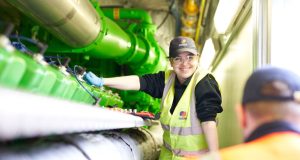FMJ recently held a RICS-IFMA debate at the RICS HQ in Parliament Square, London, where panel members debated how FM should be redefined for the 21st century
It’s been well documented that there are many challenges affecting the FM sector. These include recent events such as the collapse of Carillion and the controversial decision by the BIFM to change its name; external influences, including digital disruption and flexible working patterns; and a growing appreciation of the huge impact the workplace can have on performance and wellbeing. Given these developments, the RICS-IFMA discussion looked at the role of facilities management, asking whether the FM is being transformed into a workplace manager with a wider remit than building services. It also explored ways the sector could advance over the next few years.
FMJ was delighted to welcome a distinguished panel of experts to ponder these issues. The discussion was facilitated by Deborah Rowland, Director of Public Sector Affairs at Sodexo Global Government Services, and the panel comprised FM Guru Martin Pickard, President of the International Facility Management Association (IFMA) UK Chapter; Owen Gower, Business Performance and Quality Manager for the facilities directorate, Sheffield Hallam University; Andrew Mawson, Director at Advanced Workplace Associates, and Trina Marshall, Principal, Regional Leader of Consulting for HOK.
Deborah Rowland kicked off the proceedings by displaying Martin Pickard’s well-known mind map of FM, which vividly illustrates the sheer scale and breadth of the sector. This was followed by the less illustrative but functional ISO 41011:2017 3.1.1 definition of facilities management by IFMA, which says FM is an “organisational function which integrates people, place and process within the built environment with the purpose of improving the quality of life of people and the productivity of the core business.”
“So,” asked Rowland, “does FM need to change at all, does it need to change its title to workplace, and if this is the case is it because we need to attract more talent?”
Martin Pickard thought not. “The definition of FM has been done by IFMA and we would rather not start again,” he said. “The role of FM is and always has been to understand the needs of organisations and to deliver services and support places that help them to succeed. Workplace has always been part of the FM agenda, but if we narrow FM by redefining it as workplace, we exclude residential FM, retail, hospitals, prisons, football stadiums etc. People work there but that isn’t the focus of those organisations. They’re focused on the shopping experience, the patient experience, the student experience, and if we only focus on the workplace, the industry will fail.”
In response, Andrew Mawson remarked: “FM tends to be perceived as to do with the building, and as being an operational discipline, albeit one which is very important. I think workplace management tends to be about managing and influencing all the things that go to deliver a successful workplace. The term workplace for me doesn’t mean a different discipline, it means a place where people work and FM means managing the environment around those people, focused on the building.”
Trina Marshall took a centrist approach to the argument, remarking that as someone who has been on the front line of FM for nearly two decades, “My concern is, if we’re focusing on trying to define something we are driving it to be something finite and it isn’t necessarily going to continue to evolve. The arguments over whether we combine it with workplace or not is too limiting. We should embrace the fact that change is inevitable, and if we limit our thinking as to either/or FM, workplace, HR or real estate, we’ll limit the opportunities for the clients we’re ultimately trying to serve.”
THE FM BRAND
Owen Gower pointed out that FM as a brand is still not recognised enough outside of the industry. “The people we need to get this across to are the potential clients, users, stakeholders and talent coming into the industry, but as Martin has pointed out FM is so broad there is a difficulty in defining it. When I tell people the industry I work in I don’t say FM, which is a shame; I say built environment and property consultant, which doesn’t exactly describe what we do but it’s something people can understand.”
Rowland moved the discussion on with the question: “With emotional intelligence increasingly being seen as a facet of a well-designed, human-centric workplace, how does FM/workplace embrace this?”
Marshall argued that the sector has “a collective responsibility to understand the role that we’re playing in supporting the users and consumers of facilities, and we must do that in a thoughtful way, otherwise we will just be contributing to poor workplace health.” Gower was keen to disabuse people of the notion that the younger generation want anything vastly different from more seasoned workers. “If someone asked me as a millennial, would I like to work more remotely and have a beanbag chair, I’d throw my avocado toast at them.”
Another key question Rowland posed for the panel was how do we move away from FM being part of a property-only function, and how do we prove it supports wider communities, including the gig economy, and helps promote social value?
Pickard reckoned his generation had failed as FMs “because there are still lots of people out there who still think it’s just about the built environment and workplaces, and not the social infrastructure. Successful FMs are those who embrace new technology and work effectively with other disciplines. All that isn’t new, it’s what we have always done, and I’m disappointed we haven’t got the message through that great facilities management is about doing all these things that FMs have been doing for years.”
On a more positive note, looking at the smart city agenda and the ways in which FM can embrace the potential of IoT and AI, Gower shared some of the positive ways technology is impacting on services at Sheffield Hallam. “Instead of putting sensors in spaces,” he said, “we put some analytics in the Wi-Fi modules which just counted how many mobile pings it was getting – which tells us how many people were in that space.”
Marshall commented: “The fact that you’ve achieved this with information which is already available goes to show that technology isn’t always the answer – it’s more about what technology can do for us.” She added: “Being smart means appreciating things will happen, and being proactive in supporting and planning for them.”




